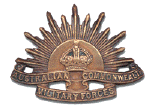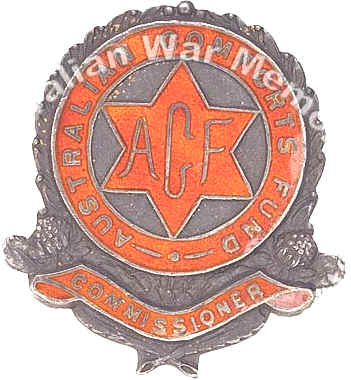 |
| Category: Army
History/WW2 |

|
|
|
|
|
|
Australian Comforts
Fund |
| While many
young Australian women yearned to take an active role in the war, their
opportunities were much more limited than those of their British
counterparts.
Australian nurses served overseas, but
Australian women were not mobilised for war work.
Numerous women's volunteer
organisations sprang up to offer more traditional assistance to the
troops.
The Australian Comforts Fund provided
extra clothing, food, tobacco and other 'comforts' for the troops. |
 |
 |
Socks were urgently needed,
as the soldiers could not wash or dry their socks in the mud and cold of
the trenches. Women knitted tens of thousands of socks: in the winter of
1916 alone, the Australian Comforts Fund provided 80 000 hand-knitted
pairs of socks in response to an appeal from General Birdwood! The
Soldiers' Sock Fund in Sydney sent away almost 21 000 pairs of socks per
year.
In Adelaide, women from different levels of society set up the Cheer-Up
society to provide welcoming concerts, gifts and food to troops in camp. |
|

|
| A distribution
of gifts of the Australian Comforts Fund to the 13th Battalion at
Ribemont. These were red-letter days for the troops, and not the least
welcome of the home gifts was the bundle of Australian newspapers and
periodicals. Identified, right to left: 2797 Sergeant (Sgt) T Piddington;
599 Company Quartermaster Sergeant (CQMS) H J Clay (handing out a
parcel); unidentified (partially obscured); 3849 Private (Pte) Frank
McArthur; 5170 Sgt Edward Winston Robertson (killed in action 28 March
1918); 2484 Pte Theo Maurice Chiplin, all other men unidentified. |
 |
 |
| The ACF
provided on a regular basis, writing materials so the troops could write
home. This is a pencil that was hidden in it's own case until needed. |
 |
Rectangular
tin with hinged lid and covered with cream paper. The lid is decorated
inside and out with a red border and an Australian flag.
Printed in black cursive script above
and below the flag are the words 'WISHING YOU A HAPPY XMAS/ From the
Australian Comforts Funds'.
Inside the tin, the contents are
intact and include a circular tin of 'Full Strength "Capstan"
Navy Cut' tobacco; a packet of ten 'Medium Strength "Capstan"
Navy Cut' cigarettes; and a packet of French-Egyptian 'Encore'
cigarettes.
Also included are a box of Swedish
made 'The Ship' safety matches and a red cardboard box with two cigars.
This parcel was given to 2284 Private
Sidney Thomas Elliott of 21 Battalion by the Australian Comforts Fund at
Christmas 1915. |
| Elliott
was born in Portsmouth, England and educated in Wales. He became a
merchant seaman, serving his apprenticeship at sea and becoming a
quartermaster in the P&O Company by the time of his enlistment in
the AIF in Melbourne on 9 July 1915. Serving in 21 Battalion, AIF,
including time as batman to Captain Holmes, he was killed in action near
Longette on 20 March 1917 and buried at Villers-Bretonneux. His sister,
who remained in Wales with the rest of Elliot's family, forwarded the
intact box to Australia House in London in the 1960s, from where it was
donated to the Australian War Memorial. AWM image
& text |
|

|
|
Christmas in Cairo - distribution of
gifts at Meadi
Christmas morning saw the distribution
of 34,299 billies and 31,196 Christmas boxes specially provided by the
local committee of the A.C.F. [Australian Comforts Fund) to our men in
the camps around Cairo.
Everyone is talking about the splendid generosity of Australia in
supplying her soldiers with such splendid Christmas gifts. Mr William
Beit had arranged for the gifts to be distributed at the different camps
by the ladies of the local committee assisted by other well known ladies
from Australia who are such splendid work over here, and they vied with
one another in making the occasion as gay as possible. |
 |

|
Teacup
In A Storm
For
the Australian troops in the front line, the Australian Comforts Fund
coffee stall became a treasured refuge from the misery of the trenches.
Chaplain W.E. Dexter established the first stall behind the lines at
Pozieres in August 1916 and under the auspices of the ACF many more were
set up and staffed by soldiers and clergy. Throughout the bitterly cold
nights, in tents, dugouts and hastily assembled huts at the corner of
every Australian battlefield, the stalls dispensed mugs of tea, coffee
and cocoa to the exhausted troops trudging in and out of the line.
According to the ACF’s meticulously recorded statistics, more than 12
million such mugs of coffee and tea were served during the First World
War.
|

|
|
ACF fund raising
pin-back badges from 1941. |
The
ACF did not just brew up coffee for the troops. Local women’s groups
in Australia sprang up early in the war to provide tobacco, cakes,
puddings, condensed milk, sugar,, biscuits newspapers and other
‘luxury’ items to supplement the Australian soldier’s army rations
and personal kit. These fund-raising bodies were amalgamated in 1916 to
form a national body which undertook to provide ‘comforts’ to all
Australians abroad. The ACF grew into an enormous fundraising,
collecting, sorting and distribution machine which rivalled the scope of
the Red Cross. Although men took some executive positions on national
and state committees, the bulk of the administrative and manual work
fell on a huge ‘army’ of unpaid women.
A
phenomenal 1,354,328 pairs of woollen socks, knitted by volunteers and
shipped to Europe by the ACF, represented an estimated 10 million
hour’s work. Nearly two million Christmas boxes containing writing
wallets, chewing gum, handkerchiefs, tobacco, and sausages were sent to
England and France during the war as well as thousands of shirts, vests,
pyjamas and kangaroo-skin fleece-lined jackets.
The
ACF was a source of solace and encouragement for the troops abroad; it
was also a means for the women at home to contribute to the war effort
and identify with their young men in the trenches. The vast amount of
organisational work involved in running the ACF developed new managerial
skills among the women themselves. They raised thousands of pounds,
through door-knock appeals, fetes and button days to cover the costs of
materials and shipping.
The
ACF was dissolved at the end of the war, but had proved such a success
as a vital link between home and the battlefield that it was revived in
1940 to supply ‘comforts’ for a new generation of Australian
soldiers.
©
Time-Life Australia Pty Ltd 1998
(from the series Australians at War)
|
|
A selection of ACF posters
from WW2 to raise funds or supplies. |
|
as on sale at the http://www.joseflebovicgallery.com/ |
 |
Safe Journey thanks to him.
Express your thanks by giving to the Australian Comforts Fund,
c.1940.
|
 |
He won't be
lonely with a radio! Donate to the Australian Comforts Fund. They supply
them!, c.1940.
|
 |
We're putting all our begs in
one ask-it! A donation today sends a hamper away! Australian Comforts
Fund, c.1940.
|
 |
And the girls
too - all services are serviced by Australian Comforts Fund. Back them up
with a donation!, c.1940.
|
 |
Combine forces
with the Australian Comforts Fund. Give to them through the ACF…,
c.1939-45.
Showing the heads of
five servicemen and women with the insignia of YMCA, YWCA, The Salvation
Army
|
 |
Books. 1,000,000
Books wanted. ACF Camp Library Service, c.1939-45.
|
 |
Give him a Book - 1,000,000
books wanted. ACF Book Week Appeal, March 5-11. Camp Library,
c.1939-45.
|
|
|
|
 |
|
|
ACF Honor Medal 1916 |
|
|